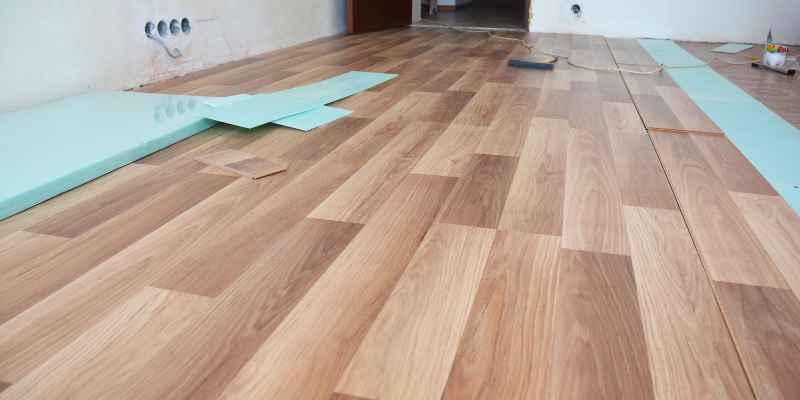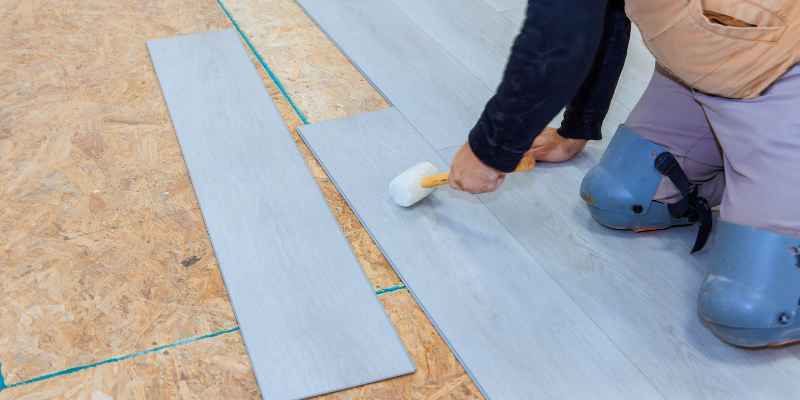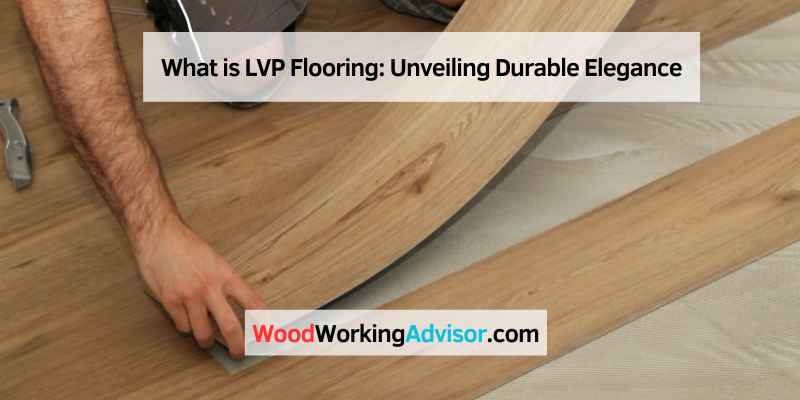LVP flooring, also known as Luxury Vinyl Plank flooring, is a durable and versatile type of flooring that mimics the look of hardwood. It is made up of multiple layers, including a wear layer, vinyl core, and backing, providing resistance to scratches, dents, and water damage.
LVP is a popular choice for homeowners looking for an affordable and low-maintenance flooring option that offers the aesthetic appeal of hardwood without the drawbacks. With its ease of installation and wide range of styles and colors available, LVP flooring has become a preferred choice for many households.
Introduction To Lvp Flooring
LVP flooring, also known as Luxury Vinyl Plank flooring, has gained immense popularity in modern interiors. This innovative flooring option offers a perfect blend of style, durability, and affordability. Whether you are renovating your home or designing a commercial space, LVP flooring provides a wide range of benefits that make it a preferred choice for many.
The Rise Of Lvp In Modern Interiors
LVP flooring has witnessed a remarkable rise in popularity in modern interiors. With its ability to mimic the look of natural materials like hardwood, stone, or tile, LVP flooring offers a versatile and cost-effective alternative. Its realistic textures and patterns create a visually appealing ambiance, adding a touch of elegance to any space. Additionally, LVP flooring is available in a wide range of colors and designs, allowing you to unleash your creativity and achieve the desired aesthetic.
Comparing Lvp To Traditional Flooring Options
When it comes to comparing LVP flooring to traditional options like hardwood or laminate, LVP has several advantages. Firstly, LVP flooring is highly resistant to moisture, making it an ideal choice for areas prone to spills or high humidity. Unlike hardwood, LVP can be safely installed in bathrooms, kitchens, or basements without worrying about water damage. Additionally, LVP flooring is more durable and scratch-resistant, making it suitable for high-traffic areas.
Moreover, LVP flooring is easy to maintain. It requires minimal effort to keep it clean and looking as good as new. Regular sweeping or vacuuming, along with occasional mopping, is sufficient to keep the floor free from dust and dirt. This low-maintenance feature is particularly beneficial for busy households or commercial spaces where time is of the essence.
Furthermore, LVP flooring offers excellent sound absorption properties, reducing noise transmission between floors. This makes it an ideal choice for apartments, offices, or multi-level buildings. The installation process of LVP flooring is also relatively quick and hassle-free. It can be easily installed over most existing floors, saving time and money on subfloor preparation.
In conclusion, LVP flooring has revolutionized the flooring industry with its versatility, durability, and affordability. With its wide range of design options and numerous benefits, LVP flooring is an excellent choice for anyone looking to enhance the aesthetic appeal and functionality of their space.

Composition Of Lvp
Luxury vinyl plank (LVP) flooring is composed of several layers, including a durable wear layer, a printed design layer, a waterproof core, and a backing layer for stability. This composition makes LVP a versatile and resilient flooring option for both residential and commercial spaces.
Materials And Layers Explained
LVP, or Luxury Vinyl Plank flooring, is a popular choice known for its durability and affordability.
It is composed of several layers that work together to create a strong and resilient flooring option.
The Role Of The Wear Layer
The wear layer is a crucial component of LVP flooring, providing protection against scratches and stains.
It helps to maintain the appearance of the flooring over time, ensuring longevity and durability.
Design And Aesthetic Appeal
LVP flooring offers a modern design and high aesthetic appeal, enhancing any space with its stylish look. The durable material mimics the appearance of natural materials like wood or stone, providing a cost-effective and visually pleasing flooring solution.
impressive design and aesthetic appeal, offering a wide range of options to suit various preferences and styles.
Wood-look And Other Finishes
authentic wood-look finishes that mimic the natural beauty of hardwood floors. Additionally, LVP is available in a plethora of finishes, including stone, tile, and abstract patterns, offering endless possibilities for enhancing your interior decor.
Integrating Lvp With Home Decor
versatile design options. Whether you prefer a rustic farmhouse look or a modern minimalist style, LVP flooring can effortlessly complement your existing decor. Plus, with its waterproof properties, LVP is ideal for high-moisture areas like kitchens and bathrooms.
In summary, LVP flooring’s design and aesthetic appeal make it a popular choice for homeowners looking to achieve both beauty and functionality in their living spaces.
Installation Process
Installing LVP flooring can be a straightforward process, whether you opt for a DIY approach or hire a professional. The installation method can impact the overall look and durability of your flooring, so it’s important to consider your options carefully. Let’s explore the two primary installation methods for LVP flooring.
Diy-friendly Click And Lock Systems
Many LVP flooring options feature a user-friendly click and lock system, making them ideal for DIY enthusiasts. This installation method involves interlocking the planks or tiles, creating a secure and seamless surface. With clear instructions and basic tools, homeowners can achieve professional-looking results without the need for extensive experience.
Professional Installation Insights
While DIY installation can be rewarding, some homeowners prefer the expertise and efficiency that professional installers provide. Hiring professionals can ensure precise measurements, proper subfloor preparation, and seamless transitions between rooms. Professional installation can also offer peace of mind, knowing that your flooring is expertly installed for long-lasting performance.
Durability And Maintenance
Durable and low-maintenance, LVP flooring is a top choice for households seeking long-lasting, easy-to-care-for flooring solutions. Its resilience against scratches and water damage makes it an ideal alternative to traditional hardwood floors.
Scratch And Dent Resistance
Luxury Vinyl Plank (LVP) flooring is well-known for its exceptional durability and resistance to scratches and dents. The top wear layer of LVP is designed to withstand heavy foot traffic and resist damage from pet claws, furniture, and other daily wear and tear. This makes it an ideal flooring choice for high-traffic areas in both residential and commercial spaces.
Cleaning And Long-term Care
When it comes to maintaining LVP flooring, regular cleaning is key to preserving its longevity and appearance. Routine sweeping or vacuuming helps to remove dirt and debris, while damp mopping with a pH-neutral cleaner keeps the surface clean without causing damage. Additionally, placing protective pads under heavy furniture can prevent indentations and scratches, ensuring the flooring remains in top condition for years to come.
In addition, avoiding harsh chemicals and abrasive cleaning tools is important to prevent any damage to the LVP surface. By following these simple maintenance practices, you can keep your LVP flooring looking pristine and well-maintained for an extended period.
Water Resistance And Lvp
LVP flooring, also known as Luxury Vinyl Plank flooring, is a water-resistant option that offers the look of hardwood without the drawbacks. It is thicker and more durable than standard vinyl, making it ideal for high-traffic areas or homes with pets.
With its easy installation and scratch-resistant properties, LVP is a great alternative to hardwood flooring.
Lvp In Moisture-prone Areas
When it comes to flooring options, luxury vinyl plank (LVP) has become a popular choice due to its durability, affordability, and water resistance. This makes LVP a great option for moisture-prone areas such as bathrooms, kitchens, and basements.
Waterproof Vs. Water-resistant Flooring
It’s important to note that there is a difference between waterproof and water-resistant flooring. Waterproof flooring, such as ceramic tile or sheet vinyl, is completely impervious to water. On the other hand, water-resistant flooring, like LVP, can withstand water to a certain extent but is not completely waterproof.
LVP is water-resistant because of its vinyl composition and protective wear layer that prevents water from penetrating the surface. However, it’s important to note that water-resistant doesn’t mean water-proof, so it’s still important to clean up spills and moisture promptly to prevent damage.
When it comes to choosing between waterproof and water-resistant flooring, it ultimately depends on your specific needs and budget. If you’re looking for a completely waterproof option, ceramic tile or sheet vinyl may be a better choice. But if you want a more affordable and durable water-resistant option, LVP is a great choice.
Overall, LVP flooring is a great option for moisture-prone areas due to its water-resistant properties and durability. Just make sure to properly maintain and clean up any spills to keep your LVP looking great for years to come.

Comparing Lvp With Other Flooring
When considering flooring options, it’s essential to compare Luxury Vinyl Plank (LVP) with other popular choices to make an informed decision. Let’s delve into a comparative analysis of LVP with Laminate, Hardwood, and Standard Vinyl Planks.
Lvp Vs. Laminate
Both LVP and laminate are durable options, but they have distinct differences. Laminate is prone to scratches and chipped corners over time, making LVP a better choice, especially for homes with pets. On the other hand, LVP is scratch-resistant, but it’s more susceptible to denting and tearing compared to laminate.
Lvp Vs. Hardwood
Hardwood flooring exudes timeless elegance, but LVP offers advantages such as water resistance and durability. LVP can mimic the look of hardwood while providing enhanced resistance to moisture and wear, making it a practical choice for areas prone to spills and heavy foot traffic.
Lvp Vs. Standard Vinyl Planks
The difference between luxury vinyl planks (LVP) and standard vinyl lies in their thickness and durability. LVP is thicker and more durable, making it a superior choice for areas with high traffic and potential moisture exposure. Standard vinyl planks are thinner and less resilient, making them more suitable for low-traffic areas with minimal exposure to moisture.
Environmental Considerations
LVP flooring, also known as Luxury Vinyl Plank, is renowned for its eco-friendly attributes. When considering LVP flooring, it is crucial to contemplate its environmental impact. Let’s delve into the environmental considerations associated with LVP flooring.
Sustainability And Recycling
One of the key environmental benefits of LVP flooring is its sustainability. LVP is often manufactured using recycled materials, including post-consumer vinyl. Additionally, it is fully recyclable at the end of its lifespan, reducing its environmental impact.
Indoor Air Quality And Health
When it comes to indoor air quality and health, LVP flooring excels. It is certified for low volatile organic compound (VOC) emissions, ensuring that it does not release harmful chemicals into the indoor air. This makes it a safe and healthy choice for indoor environments.
Cost Analysis
Cost analysis is a vital process that involves evaluating expenses to make informed financial decisions. When it comes to LVP flooring, it refers to Luxury Vinyl Plank flooring, a durable and cost-effective alternative to traditional hardwood floors. LVP flooring offers a wide range of styles and colors while being easier to maintain, making it a popular choice for modern homes.
Affordability Of Lvp
When it comes to affordability, LVP (Luxury Vinyl Plank) flooring is a great option for those who want a high-end look without breaking the bank. LVP is significantly cheaper than hardwood flooring and even some types of laminate flooring. Additionally, LVP requires little maintenance and is very durable, making it a cost-effective option in the long run.
Return On Investment
Investing in LVP flooring can yield a high return on investment (ROI) for homeowners. With its realistic wood or stone look, LVP can increase the value of a home and make it more attractive to potential buyers. Additionally, LVP is waterproof and scratch-resistant, which means it can withstand wear and tear from daily use, making it a practical option for families with kids and pets.
Overall, LVP flooring offers a great cost-benefit analysis, with its affordability and high ROI making it a top choice for homeowners.
The Future Of Lvp Flooring
Luxury Vinyl Plank (LVP) Flooring is a popular and durable flooring option that mimics the look of hardwood flooring. It is made of multiple layers including a wear layer, a design layer, and a rigid core, making it waterproof and resistant to scratches and dents.
The future of LVP flooring looks promising as it continues to improve in design and technology.
Innovations In Lvp Technology
Luxury Vinyl Plank (LVP) flooring has seen remarkable advancements in technology. Innovations in the manufacturing processes have led to the creation of more realistic wood and stone looks, as well as improved durability and waterproof properties. Cutting-edge embossing techniques have enhanced the texture and feel of LVP, providing a more authentic hardwood or tile appearance. Moreover, advancements in installation methods have made LVP more accessible and cost-effective for homeowners and businesses alike.
Trends In Flooring And Lvp’s Place
In the ever-evolving world of flooring, trends are constantly shifting. LVP has emerged as a frontrunner due to its versatility, durability, and aesthetic appeal. With a wide range of designs and patterns available, LVP has become a popular choice for both residential and commercial spaces. Its ability to mimic the look of natural materials while offering enhanced performance and low maintenance has placed LVP at the forefront of modern flooring trends.
Frequently Asked Questions
What Is The Downside Of Lvp Flooring?
The downside of LVP flooring is that it can dent, scratch, or scuff, especially from heavy appliances or furniture. Laminate flooring is prone to scratches and chipped corners over time, while LVP is more vulnerable to denting and tearing. LVP is a better choice if you have pets, but hardwood floors offer a more natural look.
What Is Better, Lvp Or Laminate?
When comparing LVP and laminate flooring, both have their pros and cons. LVP is more scratch-resistant and suitable for homes with pets, while laminate is prone to scratches and chipped corners over time. However, LVP is more vulnerable to denting and tearing.
Ultimately, the choice depends on personal preference and specific needs.
What Is The Difference Between Vinyl Planks And Lvp?
Vinyl planks and LVP (luxury vinyl planks) are essentially the same thing. However, LVP is thicker and more durable, making it ideal for high-traffic areas or homes with pets. LVP is also easier to install, as it can be clicked together like laminate flooring.
Ultimately, the choice between the two depends on personal preferences and budget.
Is Lvp As Good As Hardwood?
LVP is highly durable and water-resistant, but engineered hardwood offers a natural look preferred by some. Ultimately, the choice depends on budget and personal preference.
Conclusion
To sum it up, LVP flooring is a durable, water-resistant, and cost-effective alternative to hardwood flooring. It’s made of multiple layers, including a rigid core and a wear layer, which gives it its strength and durability. LVP is available in a variety of colors and designs, making it a versatile flooring option for any room in your home.
Plus, it’s easy to install and maintain. Whether you’re looking to renovate your home or simply update your flooring, LVP is definitely worth considering.


